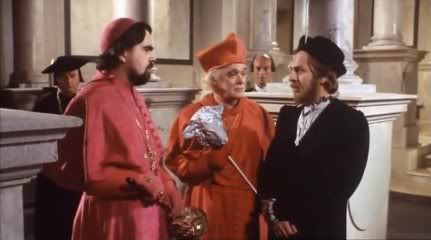How can those in power leave a man at large who tells the truth?

In 1975, the American Film Theatre opened its second season with Joseph Losey's adaptation of Bertolt Brecht's Galileo, which he had previously directed on the stage in 1947. That production -- the first in the U.S. -- featured Charles Laughton in the title role, but for the screen version it was given to Topol, who was then best known for playing Tevye in Fiddler on the Roof (and probably still is). For me, however, I'll always think of him as forward-thinking rocket scientist Dr. Hans Zarkoff in Flash Gordon, so it's not that much of a stretch to see him as a heretical mathematician and astronomer who challenges The Church and pays a steep price for his intellectual curiosity.
The film opens in Venice, 1609, with Galileo as an underpaid professor of mathematics who has to take on private students to make ends meet. After one (Tim Woodward, who eventually becomes engaged to his daughter, Mary Larkin) gives him the idea for the telescope -- and he passes it off as his own invention so the university will give him a raise -- Galileo begins pointing it at the night sky and making some observations that alarm Venetian senator Michael Gough, who nevertheless tries to talk him out of moving to Florence, where he believes he'll have more freedom. Instead, he attracts the attention of Rome and the ire of cardinals both old and cantankerous (John Gielgud and Patrick Magee) and young and dangerous (Michael Lonsdale and Edward Fox). All the while, his most constant supporter is his housekeeper's intellectually curious son, who grows up to be his star pupil (and is played by Tom Conti). Naturally, he's the one who's hit the hardest when the old man is forced to recant his beliefs. Even as he's watched over by the Inquisition, though, Brecht's Galileo proves that you can take the man out of science, but you can't take the scientist out of the man.